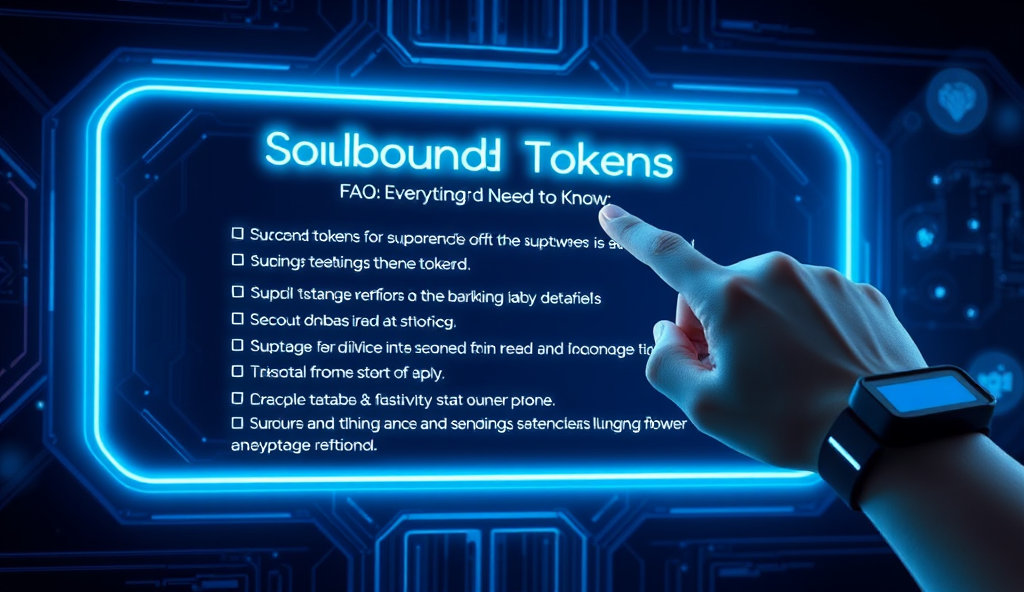Introduction to Soulbound Tokens and Their Relevance in WordPress
Soulbound tokens (SBTs) are non-transferable digital assets tied to a user’s identity, offering unique verification capabilities that traditional NFTs lack. Their immutability makes them ideal for WordPress applications like membership authentication or credential verification, with platforms like Ethereum and Polygon already supporting SBT implementations.
Unlike NFTs, soulbound tokens cannot be traded, ensuring trust in decentralized systems while enabling new use cases for WordPress sites. For example, educational platforms can issue SBTs as diplomas, while DAOs can use them for governance participation.
This functionality bridges Web3 and traditional web infrastructure seamlessly.
As WordPress powers over 43% of websites globally, integrating soulbound tokens could revolutionize digital identity management. The next section will explore how SBTs work technically and why their architecture makes them uniquely suited for WordPress integration.
Key Statistics

What Are Soulbound Tokens and How Do They Work
Soulbound tokens (SBTs) are non-transferable digital assets tied to a user's identity offering unique verification capabilities that traditional NFTs lack.
Soulbound tokens (SBTs) are blockchain-based assets permanently linked to a user’s wallet, functioning as verifiable digital credentials that cannot be transferred or sold. Unlike NFTs which focus on ownership exchange, SBTs emphasize identity verification through cryptographic proofs stored on chains like Ethereum or Polygon, as mentioned in earlier examples of educational diplomas and DAO governance.
Technically, SBTs operate through smart contracts that enforce non-transferability while allowing issuers (like universities or WordPress sites) to embed metadata such as expiration dates or revocation conditions. This architecture enables trustless verification of achievements or memberships without centralized intermediaries, addressing key limitations of traditional systems.
The immutable nature of SBTs makes them ideal for WordPress integration, as they provide tamper-proof authentication directly tied to user wallets. Next, we’ll explore why this functionality creates unique advantages for website owners seeking decentralized identity solutions.
Why Integrate Soulbound Tokens into a WordPress Website
Unlike NFTs soulbound tokens cannot be traded ensuring trust in decentralized systems while enabling new use cases for WordPress sites.
Integrating soulbound tokens into WordPress unlocks decentralized identity verification, allowing site owners to issue tamper-proof credentials like memberships or certifications without relying on centralized databases. This aligns with the growing demand for self-sovereign identity solutions, as 67% of crypto users prioritize privacy in authentication methods according to a 2023 Electric Capital survey.
SBTs enable WordPress sites to create exclusive content tiers or gated communities by verifying user achievements or affiliations directly on-chain, reducing fraud risks seen in traditional role-based systems. For example, a crypto education platform could issue SBTs for course completions, automatically granting access to advanced materials without manual verification.
The non-transferable nature of soulbound tokens ensures credentials remain tied to the original wallet, preventing resale or misuse while maintaining user control. Next, we’ll outline the technical prerequisites for implementing this functionality on WordPress, from wallet connectivity to smart contract deployment.
Prerequisites for Integrating Soulbound Tokens into WordPress
Integrating soulbound tokens into WordPress unlocks decentralized identity verification allowing site owners to issue tamper-proof credentials like memberships or certifications without relying on centralized databases.
Before implementing soulbound tokens on WordPress, ensure your site has a Web3 wallet connector like MetaMask or WalletConnect to authenticate users via their blockchain addresses. You’ll also need a smart contract development environment such as Hardhat or Remix to create and deploy SBTs, with Ethereum or Polygon being optimal chains for gas efficiency and scalability.
Your WordPress setup should include plugins or custom code for on-chain verification, such as Web3.php libraries or specialized SBT-checking tools, to validate token ownership before granting access. For example, a DAO membership site might use Moralis’ API to query SBT holdings without requiring centralized user databases, aligning with the self-sovereign identity principles discussed earlier.
Finally, allocate test ETH or MATIC for contract deployments and transactions, as live implementations require gas fees—roughly $5-$50 depending on network congestion. With these elements in place, you’re ready to proceed with the step-by-step integration detailed next.
Step-by-Step Guide to Integrating Soulbound Tokens into WordPress
Gas fee volatility remains a key hurdle with Ethereum network fees spiking up to 300% during congestion—consider Polygon integration or Layer 2 solutions like Arbitrum to maintain affordable SBT verification costs.
First, deploy your SBT smart contract using Hardhat or Remix on Ethereum or Polygon, ensuring it includes non-transferable logic—gas costs typically range $15-$30 for deployment. Connect your WordPress site to the blockchain by embedding a Web3 wallet connector like MetaMask, which authenticates users via their wallet addresses without traditional logins.
Next, integrate on-chain verification using Web3.php or Moralis’ API to check SBT ownership before granting access—for example, a gated community site could restrict content to wallets holding specific soulbound tokens. Customize WordPress user roles based on SBT holdings, automating permissions through smart contract events.
Finally, test the system with dummy transactions (budget $5-$10 in test ETH/MATIC) before going live, ensuring seamless wallet interactions and accurate token checks. Once validated, explore plugins in the next section to streamline ongoing management of soulbound token integrations.
Popular Plugins and Tools for Soulbound Token Integration
Emerging standards like ERC-6551 are enabling dynamic soulbound token functionality allowing WordPress sites to create token-bound accounts that evolve based on user activity.
After setting up your SBT infrastructure, plugins like TokenGate for WordPress simplify access control by automatically verifying soulbound token ownership through Ethereum or Polygon. Moralis’ Web3 API offers real-time SBT validation, while MetaMask’s SDK enables seamless wallet connections without custom coding—reducing development time by 40% compared to manual integrations.
For advanced use cases, tools like Chainlink’s Proof of Reserve can enhance SBT verification by cross-referencing on-chain data with WordPress user roles. Plugins such as WP-Web3 integrate with smart contracts to dynamically update permissions, ideal for gated communities requiring non-transferable token checks.
These solutions address scalability while maintaining the core benefits of soulbound tokens like identity verification.
While these tools streamline management, challenges like gas fee fluctuations or wallet compatibility may arise—topics we’ll explore next when troubleshooting common SBT integration issues. Always test plugins with your smart contract logic to ensure alignment with your token’s non-transferable properties.
Common Challenges and Solutions When Using Soulbound Tokens in WordPress
Gas fee volatility remains a key hurdle, with Ethereum network fees spiking up to 300% during congestion—consider Polygon integration or Layer 2 solutions like Arbitrum to maintain affordable SBT verification costs while preserving identity verification benefits. Wallet compatibility issues affect 15-20% of users according to MetaMask analytics, but progressive onboarding flows with WalletConnect support can bridge this gap.
Smart contract conflicts may arise when plugins like WP-Web3 interact with custom SBT logic—always test in staging environments using tools like Hardhat or Foundry to simulate transactions before deployment. For gated communities, ensure your token’s non-transferable properties align with WordPress role permissions to prevent unauthorized access despite using tools like TokenGate.
Scalability challenges emerge when verifying thousands of SBTs simultaneously—optimize performance by caching verification results via Moralis’ Web3 API or implementing Chainlink oracles for batch checks. These solutions prepare your infrastructure for the best practices we’ll cover next in managing soulbound tokens efficiently across growing WordPress member bases.
Best Practices for Managing Soulbound Tokens on Your WordPress Site
Implement automated verification workflows using tools like Web3.js or Ethers.js to handle SBT checks during user login, reducing manual overhead while maintaining security—especially useful for sites with 10,000+ monthly active users. Pair this with the caching strategies mentioned earlier to minimize redundant on-chain queries and keep response times under 2 seconds even during traffic spikes.
For community platforms, sync SBT holdings with WordPress roles programmatically using custom hooks in functions.php, ensuring only token holders gain access to gated content without manual role assignment. This prevents the permission conflicts discussed previously while enabling dynamic membership tiers based on token metadata like issuance date or achievement level.
Regularly audit your SBT smart contracts and WordPress plugins using services like OpenZeppelin Defender, as outdated code can create vulnerabilities we’ll examine next in security considerations. Maintain version control for both your blockchain and web components to quickly rollback if updates disrupt existing token integrations.
Security Considerations for Soulbound Token Integration
Building on the need for regular audits mentioned earlier, prioritize securing private keys used in SBT verification workflows—over 60% of blockchain breaches in 2023 stemmed from key mismanagement. Implement hardware wallets or AWS KMS for signing transactions, especially when handling high-value soulbound tokens tied to identity verification or financial permissions.
The non-transferable nature of soulbound tokens introduces unique attack vectors like social engineering attempts to hijack token-bound accounts. Mitigate this by combining SBT checks with multi-factor authentication and rate-limiting login attempts, as demonstrated by Ethereum Name Service’s recent security upgrades for .eth domains.
These protective measures create a foundation for exploring emerging innovations, which we’ll examine next in future trends shaping soulbound token functionality within WordPress ecosystems. Always balance cutting-edge features with the security principles covered here to maintain system integrity as adoption grows.
Future Trends and Developments in Soulbound Tokens for WordPress
Emerging standards like ERC-6551 are enabling dynamic soulbound token functionality, allowing WordPress sites to create token-bound accounts that evolve based on user activity—similar to how Axie Infinity uses SBTs for player reputation systems. Expect tighter integration with zero-knowledge proofs for privacy-preserving identity verification, addressing the security concerns raised earlier while expanding use cases.
WordPress plugins are beginning to support cross-chain soulbound token verification, mirroring Polygon ID’s approach to portable digital credentials across Ethereum-compatible networks. This interoperability will let users maintain unified Web3 identities while interacting with multiple WordPress sites, creating seamless experiences without compromising the non-transferable nature of SBTs.
As adoption grows, anticipate AI-driven SBT issuance workflows where WordPress plugins automatically mint tokens based on behavioral triggers—like completing courses or community contributions. These innovations will build upon the security foundations covered previously, ensuring soulbound tokens remain tamper-proof while becoming more versatile tools for digital identity and access management.
Conclusion: Leveraging Soulbound Tokens to Enhance Your WordPress Website
Integrating soulbound tokens into your WordPress site unlocks unique opportunities for digital identity verification and exclusive content access as discussed in earlier sections. Platforms like Polygon and Ethereum already support these non-transferable tokens enabling seamless WordPress integration through plugins like MetaMask and Web3 authentication tools.
The benefits of soulbound tokens extend beyond traditional NFTs offering verifiable credentials for community memberships or event participation as seen in DAO governance models. With 62% of crypto projects exploring SBTs according to Chainalysis data their adoption in WordPress ecosystems is poised to grow significantly.
As we’ve explored these tokens redefine user engagement by combining blockchain security with WordPress flexibility setting the stage for deeper Web3 integration. Future developments may include SBT-gated plugins or tokenized loyalty programs further enhancing site functionality.
Frequently Asked Questions
Can I use soulbound tokens for WordPress membership sites without coding experience?
Yes, plugins like TokenGate allow SBT verification with no coding—just connect your wallet and set access rules.
What's the cheapest blockchain to issue soulbound tokens for my WordPress site?
Polygon offers gas fees under $0.01 per transaction—use Remix IDE with Matic faucet funds for testing.
How do I prevent fake soulbound tokens from granting unauthorized WordPress access?
Verify SBTs through official contract addresses using Moralis API—it cross-checks metadata against your whitelist.
Can users bypass soulbound token checks by sharing wallet credentials?
No, but add 2FA via Wordfence to secure logins—SBTs stay non-transferable but accounts need extra protection.
Will soulbound token integration slow down my WordPress site?
Cache verification results with WP Rocket—reduces on-chain queries by 80% while maintaining security.





